The Phospho-specific Antibodies Market is estimated to be valued at USD 29.3 billion in 2025 and is projected to reach USD 87.1 billion by 2035, registering a compound annual growth rate (CAGR) of 11.5% over the forecast period.
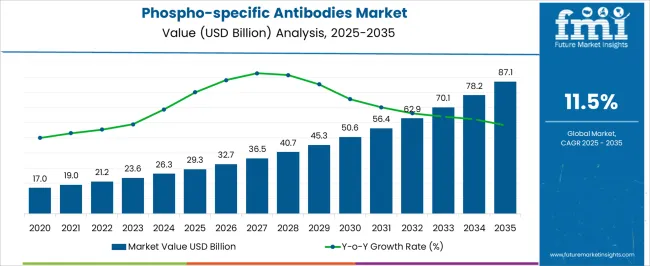
| Metric | Value |
|---|---|
| Phospho-specific Antibodies Market Estimated Value in (2025 E) | USD 29.3 billion |
| Phospho-specific Antibodies Market Forecast Value in (2035 F) | USD 87.1 billion |
| Forecast CAGR (2025 to 2035) | 11.5% |
The Phospho-specific Antibodies market is witnessing steady growth, driven by the increasing demand for highly specific antibodies in biomedical research and drug discovery. The current market expansion is influenced by the rising prevalence of chronic and complex diseases, which require detailed molecular and cellular analyses to identify precise phosphorylation events.
The adoption of advanced research methodologies and high-throughput screening techniques has enhanced the utility of phospho-specific antibodies, enabling scientists to study signaling pathways, post-translational modifications, and protein activation patterns with high precision. Investments in biotechnology research and the increasing focus on personalized medicine are further supporting market growth.
The ability of these antibodies to provide reproducible and reliable results in protein detection and functional studies makes them indispensable in laboratory settings As research organizations and pharmaceutical companies continue to prioritize targeted therapies and molecular diagnostics, the Phospho-specific Antibodies market is expected to maintain sustained growth, with ongoing innovation in antibody design and production providing avenues for expanded applications and improved performance.
The phospho-specific antibodies market is segmented by product type, binding property, application, end users, and geographic regions. By product type, phospho-specific antibodies market is divided into Gab2 (Phospho-Tyr643) Antibody, TrkA (Phospho-Tyr791) Antibody, MKK6(Phospho-Ser207) Antibody, and Others. In terms of binding property, phospho-specific antibodies market is classified into Phosphorylated Phospho Specific Antibodies and Non-Phosphorylated Phospho Specific Antibodies. Based on application, phospho-specific antibodies market is segmented into Western Blotting, Flow Cytometry, Immunohistochemistry, Immunofluorescence Microscopy, Cell Signaling Recognition, Oncological Studies, Immunocytochemistry, Elisa, Phospho Chromatin Immunoprecipitation, and Others. By end users, phospho-specific antibodies market is segmented into Research Centers, Diagnostic Laboratories, Academics, Biotechnology Institutes, and Laboratories. Regionally, the phospho-specific antibodies industry is classified into North America, Latin America, Western Europe, Eastern Europe, Balkan & Baltic Countries, Russia & Belarus, Central Asia, East Asia, South Asia & Pacific, and the Middle East & Africa.
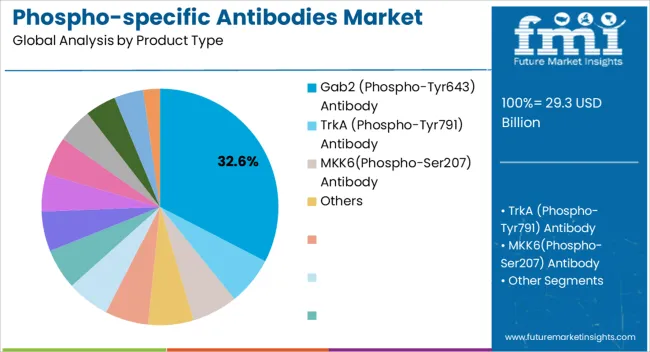
The Gab2 (Phospho-Tyr643) Antibody segment is projected to hold 32.60% of the Phospho-specific Antibodies market revenue in 2025, making it the leading product type. This dominance is attributed to the antibody's high specificity and ability to detect precise phosphorylation at the Tyr643 site, which is critical in signaling pathway research and oncology studies.
The segment’s growth has been driven by increased adoption in both academic and pharmaceutical research laboratories where accurate monitoring of protein phosphorylation is required. The robustness of Gab2 (Phospho-Tyr643) Antibodies in various experimental conditions, combined with reproducible results, has reinforced their preference over less specific alternatives.
Additionally, the growing emphasis on molecular pathway elucidation and targeted drug development has further propelled demand As research institutions continue to investigate protein modifications in disease models, the Gab2 (Phospho-Tyr643) Antibody segment is expected to retain its leadership position, supported by ongoing advancements in antibody production and validation technologies.
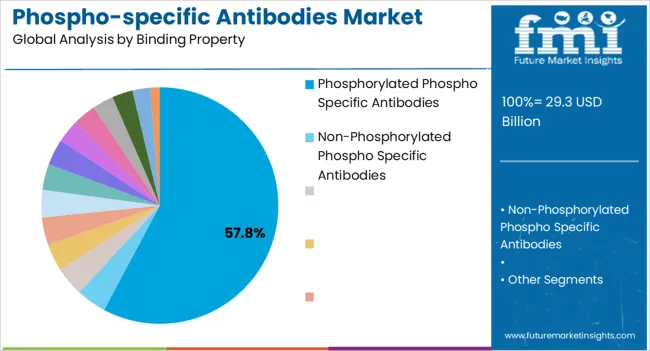
The phosphorylated phospho-specific antibodies segment is expected to account for 57.80% of the market share in 2025, establishing it as the leading binding property. This predominance is being driven by the necessity for antibodies that can accurately detect phosphorylation-dependent protein activity in complex biological samples.
The growth has been supported by the increasing focus on understanding cellular signaling mechanisms and the role of protein phosphorylation in disease progression. These antibodies are highly valued for their reproducibility and specificity, allowing researchers to conduct reliable functional analyses in both preclinical and clinical research settings.
The segment has also benefited from improvements in antibody production techniques, which have enhanced sensitivity and reduced cross-reactivity The rising demand for high-precision reagents in drug discovery, biomarker research, and systems biology studies continues to reinforce the adoption of phosphorylated phospho-specific antibodies, ensuring their sustained dominance in the market.
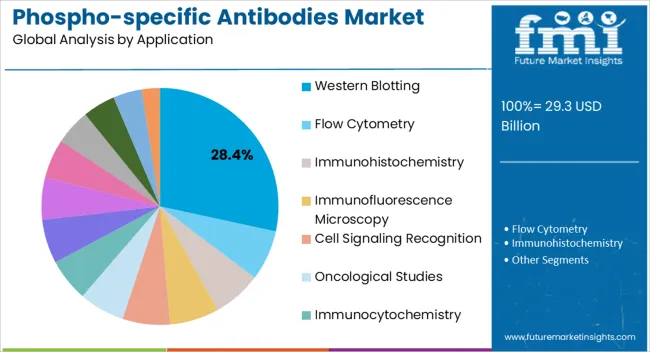
The Western Blotting application segment is projected to hold 28.40% of the market revenue in 2025, making it the leading application for phospho-specific antibodies. This segment has grown due to the widespread reliance on Western Blotting for protein detection, validation, and quantification of phosphorylation events.
The technique’s compatibility with phospho-specific antibodies provides researchers with reliable and sensitive results that are essential for signaling pathway analysis, biomarker validation, and functional protein studies. Adoption has been reinforced by the ability of these antibodies to deliver reproducible data across multiple experimental setups, reducing variability and improving the reliability of research outcomes.
Furthermore, the segment’s growth has been supported by the increasing use of Western Blotting in both academic and industrial laboratories for drug discovery, disease mechanism studies, and translational research As protein-focused studies continue to expand, the Western Blotting application segment is expected to maintain its leading position, driven by the ongoing demand for high-quality, validated phospho-specific antibodies.
Phospho-specific antibodies are the antibodies which are popularly searched antibodies across the globe. The research on these products starts recently. The process powers over the Post Translational Modification which participates in cell signalling pathway regulation guiding a wide range of cellular processes by 2 ways: It helps to set up newly specific protein-binding sites & formed some functional protein compounds or it helps to generate conformational changes at specific residues by phosphorylation process, leads to the altered enzymatic activity.
Phospho-specific antibodies are used in various validation methods, such as in western blotting, Flow cytometry, Immunohistochemistry among other procedures. The ongoing researches on phospho-specific antibodies leads to the diagnosis of many human diseases such as cancer, diabetes, endocrine disease, among other chronic disease. It drives the Phospho-specific antibodies market. Also, phospho-specific antibody for tyrosine, which specifically binds to phosphorylated tyrosine residues, is a valuable tool for analyzing tyrosine kinase activity in high-throughput drug discovery research.
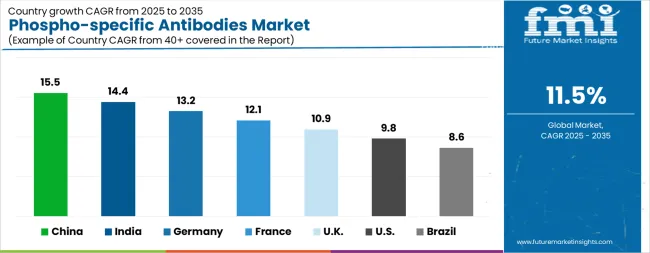
| Country | CAGR |
|---|---|
| China | 15.5% |
| India | 14.4% |
| Germany | 13.2% |
| France | 12.1% |
| UK | 10.9% |
| USA | 9.8% |
| Brazil | 8.6% |
The Phospho-specific Antibodies Market is expected to register a CAGR of 11.5% during the forecast period, exhibiting varied country level momentum. China leads with the highest CAGR of 15.5%, followed by India at 14.4%. Developed markets such as Germany, France, and the UK continue to expand steadily, while the USA is likely to grow at consistent rates. Brazil posts the lowest CAGR at 8.6%, yet still underscores a broadly positive trajectory for the global Phospho-specific Antibodies Market. In 2024, Germany held a dominant revenue in the Western Europe market and is expected to grow with a CAGR of 13.2%. The USA Phospho-specific Antibodies Market is estimated to be valued at USD 10.6 billion in 2025 and is anticipated to reach a valuation of USD 26.9 billion by 2035. Sales are projected to rise at a CAGR of 9.8% over the forecast period between 2025 and 2035. While Japan and South Korea markets are estimated to be valued at USD 1.5 billion and USD 884.6 million respectively in 2025.
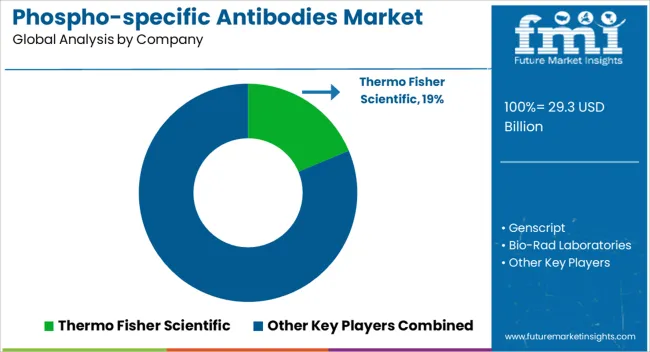
| Item | Value |
|---|---|
| Quantitative Units | USD 29.3 Billion |
| Product Type | Gab2 (Phospho-Tyr643) Antibody, TrkA (Phospho-Tyr791) Antibody, MKK6(Phospho-Ser207) Antibody, and Others |
| Binding Property | Phosphorylated Phospho Specific Antibodies and Non-Phosphorylated Phospho Specific Antibodies |
| Application | Western Blotting, Flow Cytometry, Immunohistochemistry, Immunofluorescence Microscopy, Cell Signaling Recognition, Oncological Studies, Immunocytochemistry, Elisa, Phospho Chromatin Immunoprecipitation, and Others |
| End Users | Research Centers, Diagnostic Laboratories, Academics, Biotechnology Institutes, and Laboratories |
| Regions Covered | North America, Europe, Asia-Pacific, Latin America, Middle East & Africa |
| Country Covered | United States, Canada, Germany, France, United Kingdom, China, Japan, India, Brazil, South Africa |
| Key Companies Profiled | Thermo Fisher Scientific, Genscript, Bio-Rad Laboratories, Innovagen AB, Davids Biotechnologie GmbH, AnaSpec Inc, Neo Scientific, Rockland Immunichemicals Inc, Creative-Biolabs, Creative Diagnostics, Bethyl Laboratories, Inc., Cell Signaling Technology, Abcam, Merck Millipore, and Santa Cruz Biotechnology |
The global phospho-specific antibodies market is estimated to be valued at USD 29.3 billion in 2025.
The market size for the phospho-specific antibodies market is projected to reach USD 87.1 billion by 2035.
The phospho-specific antibodies market is expected to grow at a 11.5% CAGR between 2025 and 2035.
The key product types in phospho-specific antibodies market are gab2 (phospho-tyr643) antibody, trka (phospho-tyr791) antibody, mkk6(phospho-ser207) antibody and others.
In terms of binding property, phosphorylated phospho specific antibodies segment to command 57.8% share in the phospho-specific antibodies market in 2025.






Our Research Products

The "Full Research Suite" delivers actionable market intel, deep dives on markets or technologies, so clients act faster, cut risk, and unlock growth.

The Leaderboard benchmarks and ranks top vendors, classifying them as Established Leaders, Leading Challengers, or Disruptors & Challengers.

Locates where complements amplify value and substitutes erode it, forecasting net impact by horizon

We deliver granular, decision-grade intel: market sizing, 5-year forecasts, pricing, adoption, usage, revenue, and operational KPIs—plus competitor tracking, regulation, and value chains—across 60 countries broadly.

Spot the shifts before they hit your P&L. We track inflection points, adoption curves, pricing moves, and ecosystem plays to show where demand is heading, why it is changing, and what to do next across high-growth markets and disruptive tech

Real-time reads of user behavior. We track shifting priorities, perceptions of today’s and next-gen services, and provider experience, then pace how fast tech moves from trial to adoption, blending buyer, consumer, and channel inputs with social signals (#WhySwitch, #UX).

Partner with our analyst team to build a custom report designed around your business priorities. From analysing market trends to assessing competitors or crafting bespoke datasets, we tailor insights to your needs.
Supplier Intelligence
Discovery & Profiling
Capacity & Footprint
Performance & Risk
Compliance & Governance
Commercial Readiness
Who Supplies Whom
Scorecards & Shortlists
Playbooks & Docs
Category Intelligence
Definition & Scope
Demand & Use Cases
Cost Drivers
Market Structure
Supply Chain Map
Trade & Policy
Operating Norms
Deliverables
Buyer Intelligence
Account Basics
Spend & Scope
Procurement Model
Vendor Requirements
Terms & Policies
Entry Strategy
Pain Points & Triggers
Outputs
Pricing Analysis
Benchmarks
Trends
Should-Cost
Indexation
Landed Cost
Commercial Terms
Deliverables
Brand Analysis
Positioning & Value Prop
Share & Presence
Customer Evidence
Go-to-Market
Digital & Reputation
Compliance & Trust
KPIs & Gaps
Outputs
Full Research Suite comprises of:
Market outlook & trends analysis
Interviews & case studies
Strategic recommendations
Vendor profiles & capabilities analysis
5-year forecasts
8 regions and 60+ country-level data splits
Market segment data splits
12 months of continuous data updates
DELIVERED AS:
PDF EXCEL ONLINE
IVD Antibodies Market Size and Share Forecast Outlook 2025 to 2035
Research Antibodies Market Size and Share Forecast Outlook 2025 to 2035
Monoclonal Antibodies Market Size and Share Forecast Outlook 2025 to 2035
Cardiolipin Antibodies Test Market
Long-Acting Monoclonal Antibodies Market Insights – Trends & Forecast 2024-2034

Thank you!
You will receive an email from our Business Development Manager. Please be sure to check your SPAM/JUNK folder too.
Chat With
MaRIA